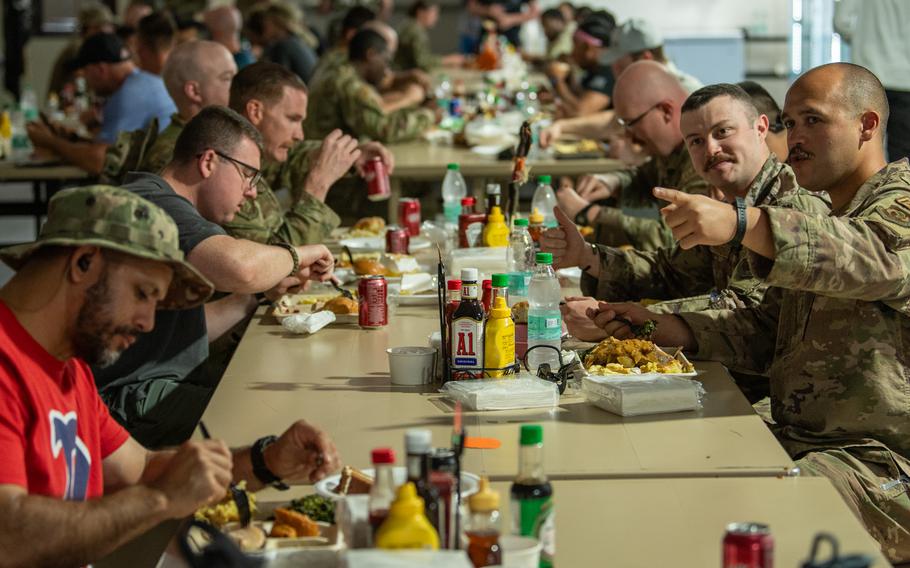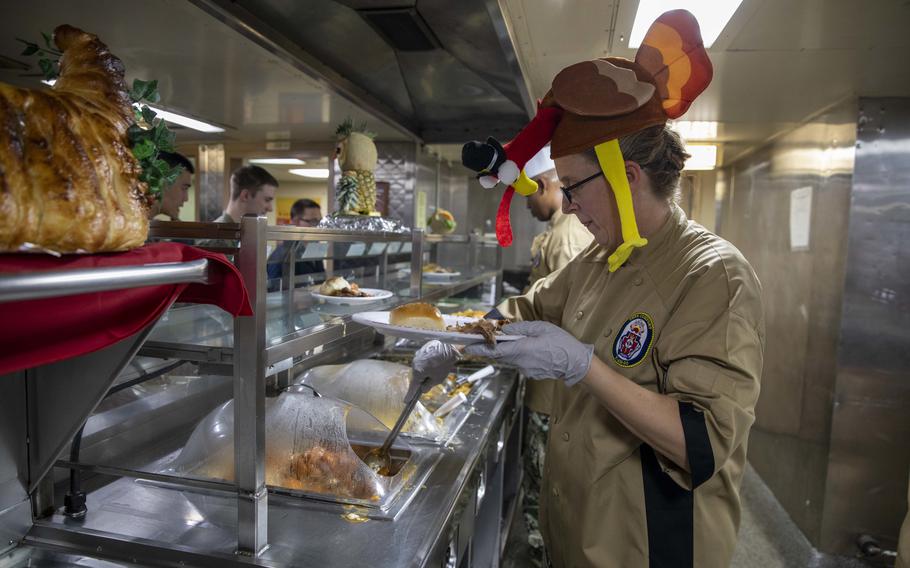
“Food is emotional, and we want to make sure that the soldiers, airmen, sailors, guardians and Marines serving around the world have that taste of home on Thanksgiving Day,” said Robin Whaley, the Defense Logistics Agency’s chief of subsistence for customers outside the continental United States. (Rose Gudex/U.S. Air Force )
WASHINGTON — Roughly 700,000 pounds of Thanksgiving food staples will be served to troops deployed to hard-to-reach places around the world.
The Defense Logistics Agency and supply centers for the armed forces have been working for months to ensure troops have traditional holiday meals to feast on Thursday regardless of where they are deployed.
“Food is emotional, and we want to make sure that the soldiers, airmen, sailors, guardians and Marines serving around the world have that taste of home on Thanksgiving Day,” said Robin Whaley, the agency’s chief of subsistence for customers outside the continental United States.
U.S. troops in hard-to-reach places around the globe have received nearly 140,000 pounds of turkey, 177,000 pounds of beef, 98,000 pounds of ham and 49,000 pounds of shrimp for service members to feast upon. Another 46,753 pounds of sweet potatoes and 9,324 cases of pies and cakes were delivered.

The Navy estimates nearly 45,000 pounds of roast turkey will be served to sailors on ships. Another 11,457 pounds of mashed potatoes and 5,654 of stuffing will be served. Topping off the meal is an estimated 23,678 assorted pies. (Ruben Rodriguez Santiago/U.S. Army )
The amount of food shipped this year is an increase from the 360,000 pounds of food sent out for last year’s Thanksgiving meals. This is due to more troops being stationed in Europe, Whaley said.
The effort requires the food to be ordered months in advance and transported to warehouses across the globe by way of cargo planes and ships and military vehicles. From there, delivery opportunities must be coordinated to military theaters such as the Indo-Pacific, Middle East and Africa. Scheduling considers the chance that operations might impact delivery opportunities, especially for those deployed to kinetic environments, such as the Middle East.
The Army, the largest of the services, begins this process in January — almost one year in advance. Coordination between transportation nodes, suppliers, vendors, regional commands and distributors work together to ensure meals reach the furthest point of the tactical footprint, said Jason Hicks, logistics management specialist for the U.S. Army’s Sustainment Command.
“Thanksgiving symbolizes family, gratitude, and tradition. Providing traditional foods helps maintain a connection to home and cultural identity for service members who are deployed. This connection can be especially important in challenging environments far from loved ones,” he said.

U.S. troops in hard-to-reach places around the globe have received nearly 140,000 pounds of turkey, 177,000 pounds of beef, 98,000 pounds of ham and 49,000 pounds of shrimp for service members to feast upon. Another 46,753 pounds of sweet potatoes and 9,324 cases of pies and cakes were delivered. (Claudia LaMantia/U.S. Army)
Celebrating Thanksgiving and other festivities, even in a modified form, provides a much-needed emotional lift to troops.
“The familiar tastes and rituals associated with the holiday can evoke positive memories and feelings of camaraderie among service members,” Hicks said.
Officials with the Mission Feeding program for the Air Force Services Center, which coordinates with the Defense Logistics Agency for the Air Force and Space Force, also said the Thanksgiving meal can boost troops’ mental health and build resilience. The service has seen about 62,000 pounds of turkey and other holiday staples delivered to airmen and guardians.
“Deployment can be isolating, especially during holidays. A traditional meal can mitigate feelings of loneliness and homesickness,” said Capt. Devonte Lee, deputy chief of the Air Force Mission Feeding program. “Special moments like these can make deployments feel less arduous and improve overall mental health, helping troops stay focused on their missions.”
The Marine Corps estimates 30,000 forward-deployed Marines will celebrate Thanksgiving thousands of miles from home, feasting on more than 18,000 pounds of turkey, as well as canned and fresh vegetables, stuffing and pies. Planning began more than four months ago.
In remote Pacific locations near the Philippines, Thailand and Palau, Marines often rely on expeditionary field kitchens and modular setups that include multifunction ovens, immersion heaters, field ranges, griddles, and tray ration heaters.
“In austere environments, power limitations and equipment reliability add to the challenge,” said Lt. Col. David Hunley, director of the Food Service and Subsistence Program for the Marine Corps. “When supplies inevitably fall short, food service Marines adjust menus accordingly, finding creative ways to use locally procured and approved ingredients to meet mission.”
High winds can threaten burners, uneven terrain can destabilize equipment, and power generators needed to run refrigeration units often need constant attention to maintain functionality, he said.
“For Marines, this mission is about more than just providing a meal. It’s about upholding the Marine Corps’ values of taking care of their own, no matter the circumstances. Even on the front lines, the spirit of Thanksgiving endures. This meal, prepared against all odds, becomes a powerful reminder of resilience, gratitude, and the unbreakable bonds of the Marine Corps family,” Hunley said.
The Navy began planning this year’s Thanksgiving and Christmas meals in March, according to Naval Supply Systems director, Cmdr. Brian Bieber.
“We know how important it is during the holidays for sailors to get that sense of home at sea. We work hard to ensure that everyone gets to celebrate Thanksgiving with a traditional meal,” he said.
The Navy estimates nearly 45,000 pounds of roast turkey will be served to sailors on ships. Another 11,457 pounds of mashed potatoes and 5,654 of stuffing will be served. Topping off the meal is an estimated 23,678 assorted pies.
In many cases, Bieber said, supplies necessary for the holiday meals will be loaded onto ships before they deploy. Doing so reduces the chance of not receiving the items in the event of an operational task or shift in schedules, he said.
Hostile environments such as the U.S. Central Command’s ongoing effort in the Middle East to defend maritime merchant ships and military warships from attacks launched by Iran-back militants can “absolutely throw a wrench” in supply schedules, but Bieber said delayed deliveries can easily and safely be stored until the next delivery opportunity.
The Naval Supply Systems Command reported Monday that all deployed warships had their Thanksgiving meals onboard, ready for feasting upon.
“It is an opportunity to provide sailors a comfort of home, despite the fact they may be deployed, on duty, or separated from family. Our culinary specialists pride themselves in curating meals that not only bring friends and shipmates together but boost morale while also fueling our sailors for success,” Bieber said.